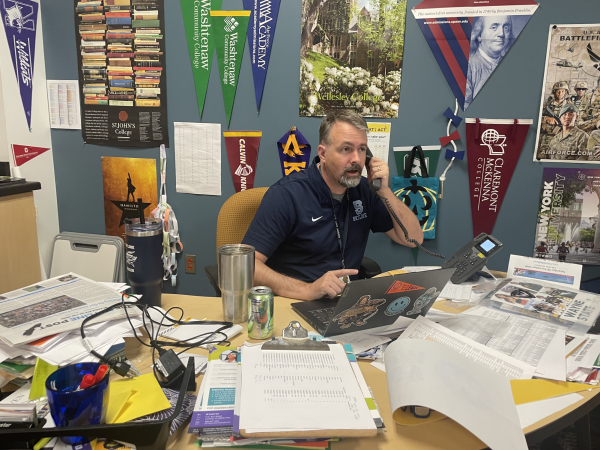The College Application Process: Tips and Tricks to Get Ahead and Get In
A student starting their college path, with the CommonApp
It’s that time of year again! College application season is in full swing as seniors get ready to apply to the colleges and universities they’ve been dreaming about attending for years. This is a very stressful time of the year for seniors, as they are trying to juggle college applications, school and homework, and extracurricular activities.
As a senior who has now applied to multiple colleges, I have learned a lot. Here is what I learned and what I would do differently now that I’ve been through this difficult process.
A quick note before I dive in: all of the tips I’m about to give you take time. Lots of time. Be sure that you plan your time wisely throughout this entire process. Dr. Blais, Skyline English and Journalism teacher, recommends that “seniors make regular weekly (and increasingly more frequent) appointments with themselves” and that they “plan the time to work on [the college application process] like it’s an extra job, because it is.”
TIP 1: Get Organized Early
I cannot stress this enough. Get organized! Start preparing for this process as early as you can! Even if that means brainstorming a small list of colleges you may be interested in or thinking about what you want to study, you can’t go wrong with being prepared.
What I did and what I strongly recommend doing is starting a basic list with a college’s name, location, average SAT score, acceptance rate, and the school’s admissions website. It may seem pointless to write this stuff down that can very easily be found on Google, but it has saved me so much precious time and I have looked at this list more than I ever imagined I would.
One of my biggest application regrets was waiting until the spring of my junior year to start making a list of colleges and gather information. This gave me less time to narrow down my list and engage with colleges that I was interested in. Showing interest in these colleges is also very important, which leads me to my next point…
TIP 2: Show Demonstrated Interest
So what exactly is demonstrated interest? To put it simply, demonstrated interest is “How colleges assess how interested a student is in attending their school,” according to Scholarships360.org. Colleges can track this in ways such as, for example, seeing if you’ve signed up for their email list or have taken a tour of campus.
While some colleges don’t track demonstrated interest, it is important nonetheless. If you know you want to apply to these colleges, you have to show them that through more than just your application. One of the best ways to show demonstrated interest is to sign up for a college’s email list. It’s relatively easy, and it shows the school that you are interested because you took the time to sign up. Once you sign up for emails, read them and interact with the college!
It is important to continue this interest throughout the whole process. Another great way to show interest is through campus visits. One of the few positive things to result from COVID is that almost every college offers virtual tours and information sessions. This is a great option if you are unable to visit a college’s campus, but even if you have the ability to visit in-person, you should still take advantage of these virtual opportunities.
TIP 3: Keep Up With Your Schoolwork
In the midst of taking time to show interest and apply to colleges, your schoolwork and grades are still extremely important. No matter where you are in this process, you still have to keep up on your schoolwork. Yes, colleges look at your grades even after you are accepted. You will be very busy throughout this process, but always remember that school comes first.
TIP 4: Leave Time to Write Your Essays
This is also very important. Good essays take time to write, and add to your already very busy schedule. I would recommend starting your essays in the summer before your senior year, as you will likely have more time before school starts. Also, be sure you know how many supplemental essays each school that you are applying to requires. Most schools only require one or two, but some require as many as eight.
Once you write your essays, have someone read over it. Whether this be a parent, friend, teacher, or the Skyline Writing Center, they can all give you valuable feedback that can immensely improve your essay. Be prepared to do a lot of revising of your essay as you get suggestions and feedback from others. My final essay looked nothing like my first one!
TIP 5: Gather Your Materials and Apply!
When gathering your materials, you need to prepare in advance. This goes back to the first thing I discussed. Letters of Recommendation take a long time to write, so it is important to ask your teacher/coach/other adult to write you one many months in advance before you apply.
People generally tend to start asking for Letters of Recommendation during the spring of their Junior year, which gives your recommender plenty of time to plan out what to write. Once your letter is written, remember to thank your recommender(s)!
Also, guidance counselors are very busy during application season, so if you need a Letter of Recommendation or transcript from them, request it early. Once you have your essays done and your Letters of Recommendation in place, start filling out applications and applying!
TIP 6: Celebrate Your Accomplishments
Remember to take some time to rest and reward yourself for all the hard work you’ve done! This process is not easy. Celebrate when you’re accepted into a college! All of your hard work throughout high school has paid off for this moment.
Your donation will support the student journalists of Skyline High School. Your contribution will allow us to cover our annual website hosting costs.

Ryan Rzeszut ('23) writes for the Sports section of the Skyline Post. In his free time, he enjoys playing tennis, hanging out with friends, and running...

Grace Lee is a Senior at Skyline as well as a Senior Editor (Junior-Senior) , Website developer, Social Media Manager, and journalist for the Skyline Post....






